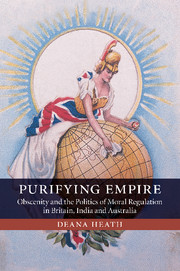Book contents
- Frontmatter
- Contents
- List of abbreviations
- Introduction: Books, boundaries and Britishness
- 1 Colonialism and governmentality
- 2 From sovereignty to governmentality: the emergence of obscenity regulation as a biopolitical project in Britain
- 3 Globalizing the local: imperial hygiene and the regulation of the obscene
- 4 Localizing the global in settler societies: regulating the obscene in Australia
- 5 Localizing the global in exploitation colonies: regulating the obscene in India
- Conclusion: Retangling empire, nation, colony and globe
- Bibliography
- Index
4 - Localizing the global in settler societies: regulating the obscene in Australia
Published online by Cambridge University Press: 06 July 2010
- Frontmatter
- Contents
- List of abbreviations
- Introduction: Books, boundaries and Britishness
- 1 Colonialism and governmentality
- 2 From sovereignty to governmentality: the emergence of obscenity regulation as a biopolitical project in Britain
- 3 Globalizing the local: imperial hygiene and the regulation of the obscene
- 4 Localizing the global in settler societies: regulating the obscene in Australia
- 5 Localizing the global in exploitation colonies: regulating the obscene in India
- Conclusion: Retangling empire, nation, colony and globe
- Bibliography
- Index
Summary
By the end of the 1880s the Australian colonies had become not only Britain's foremost colonial literary market, but the largest single market for British books and periodicals. During the following decades the trade grew to be worth over a million pounds a year to British publishers and booksellers, a sum greater than that of the print trade between Australia and all other foreign countries combined. Since ‘There is a tendency on the part of the English press and the English trade to neglect or, if noticed, to snub anything Australian’, as the Melbourne publisher George Robertson bemoaned in 1875, the trade was, moreover, highly unequal. By the Second World War, when only 15 per cent of the books sold in Australia were of indigenous origin, the efforts of British publishers to corner the Australian market had led to the virtual destruction of the indigenous publishing industry.
The dominance of the Australian literary market by British publishers spurred the British government to make more vigorous efforts to regulate the obscene in Australia than in any of its other colonies. Although the Australian colonies had federated in 1901 to form a self-governing dominion, which afforded Britain little legal power to undertake such a project, the strong socio-cultural ties that bound Australia to its imperial metropole made it amenable to receiving ‘advice’ on such a matter.
- Type
- Chapter
- Information
- Purifying EmpireObscenity and the Politics of Moral Regulation in Britain, India and Australia, pp. 93 - 147Publisher: Cambridge University PressPrint publication year: 2010



